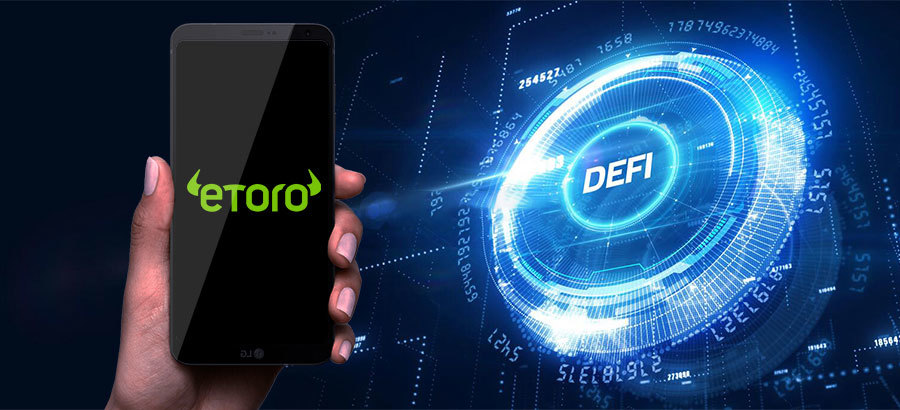
Published: September 27th, 2021
Popular online trading brokerage eToro announced last week the launch of DeFi CopyPortfolio. This new service offers crypto traders exposure to a range of tokens in the decentralised finance (DeFi) marketplace.
DeFi exploded into popularity last year and has fast become the hottest growth sector in the crypto industry. It offers traditional financial services like lending and borrowing but without payment processors or custodial middlemen like banks and brokers. DeFi solutions rely on smart contracts that can self-execute based on pre-sets agreed between counterparties.
DeFi CopyPortfolio offers access to an index of protocols including Algorand (ALGO), Basic Attention Token (BAT), Chainlink (LINK), Ethereum (ETH), Uniswap (UNI), Compound (COMP), Polygon (MATIC), Polygon (MATIC), Algorand (ALGO), and Maker (MKR).
By offering access to DeFi tokens via the relatively less risky avenue of an index, Israel-based eToro aims to boost DeFi trades by keeping traders on the platform rather than off researching individual protocols.
‘By indexing top DeFi assets, we’re doing the heavy lifting and letting traders quickly gain exposure while spreading the risk across a basket of tokens,” said the company in a statement.
The service comes with a small catch, however, as the minimum investment is USD 1,000. Traders will need to have at least this much cash to hand in order to access all the charts and other trading tools required to track DeFi portfolio performance.
eToro, backed by funding rounds valued at more than USD 270 million, is already an established player in the DeFi space. The platform offers spot trades for Uniswap, Chainlink, Maker, and Compound, amongst others.
The company’s Q2 2021 financial results showed a notable uptick in new user acquisition, adding 2.5 million new customers for a 120 per cent increase over Q2 2020.
Between April and June, the online brokerage also raked in USD 360 million in commissions, a jump of 125 per cent over the second quarter of 2020.
Despite the positive results, the company’s executives have warned that any rush to regulate the fast-growing DeFi market could impact token prices.
‘We can see that regulators in the US and globally are taking a hard look at the DeFi space and looking to create rules and regulations in the name of consumer protection, ostensibly to fight fraud,’ said company COO Avi Sela.’
Sela was responding to worries expressed by American Securities and Exchange Commission (SEC) chair Gary Gensler about the potential for DeFi projects to sell unregistered securities. If that happens, he said, those companies can expect to fall under the SEC’s purview.
Possibly to help prepare the ground for the index launch, eToro began staking out a more prominent voice for itself in the DeFi marketplace when it warned that new regulation mooted by Gensler and other financial watchdogs could hit the price of DeFi tokens.
Speaking to Bloomberg in late August, eToro CEO Yoni Assia said that regulating the DeFi space could hurt the price of tokens listed by the brokerage. ‘Many of them are valued based on the economics of their underlying DeFi ecosystems, some of which are completely open’.
Even before the index launch, eToro offered numerous DeFi tokens or trade. In May, it listed Uniswap (UNI) and Chainlink (LINK). ‘Both come with compelling use cases and reinforce the fact that not all cryptos are meant to replace cash,” said COO Sela at the time.
The platform has since added Maker (MKR), Compound (COMP), and Yearn.finance (YFI). The popularity of those tokens means eToro will feel the pinch if new regulations reduce DeFi token demand and associated transaction volumes on the platform.
‘Due diligence requires eToro to ensure that it only supports trades in digital tokens that are not categorised as securities. It's important to note, however, that those definitions can change as you move from one jurisdiction or geography to another,’ the company said in a statement.
The brokerage’s Q2 results show that its 2021 move into DeFi is delivering the goods, boosting new user signups and trading volumes.
New user acquisition jumped by 2.5 million customers, a 120 per cent increase over Q2 2020. eToro also tallied USD 360 million in commissions in the period, a rise of 125 per cent over Q2 2020.
It’s also worth noting that eToro added Dogecoin to its crypto stable this year, which is now listed tenth among all cryptocurrencies by trading volume. That’s higher than Uniswap or Chainlink, which also suggests that the brokerage’s robust user growth is diversified and not wholly down to an expanding DeFi offer.
Analysts say eToro’s impressive growth also indicates how critical millennial investors are becoming in the crypto marketplace.
Despite eToro's healthy results, that rising tide of free-wheeling millennial investors might be headed for a clash with the world’s central bankers and financial watchdogs.
‘There’s very little doubt that the decentralised finance space is going to keep attracting the attention of regulators, said Gail McEneny of Dentons, a London-based law firm specialising in financial regulation. Fraud and money laundering are key concerns in an increasingly digital economy. Regulators are naturally concerned about any space that might be operating without appropriate oversight.’
If SEC Chair Gensler's recent comments point to the direction of travel, she may well be right. Gensler has expanded on the theme recently, telling Reuters that ‘cryptocurrencies are an efficient medium of exchange, but that doesn’t mean the exchanges are legal’.
Gensler told a recent financial security summit that he believes several DeFi tokens are really securities, just unregistered and not properly categorised (yet).
DeFi bulls will no doubt find such sentiments alarming. ‘Decentralised finance platforms operate in a way that implies the application of securities law, while others imply they fall under the jurisdiction of banking and commodities trading law,’ Gensler said.